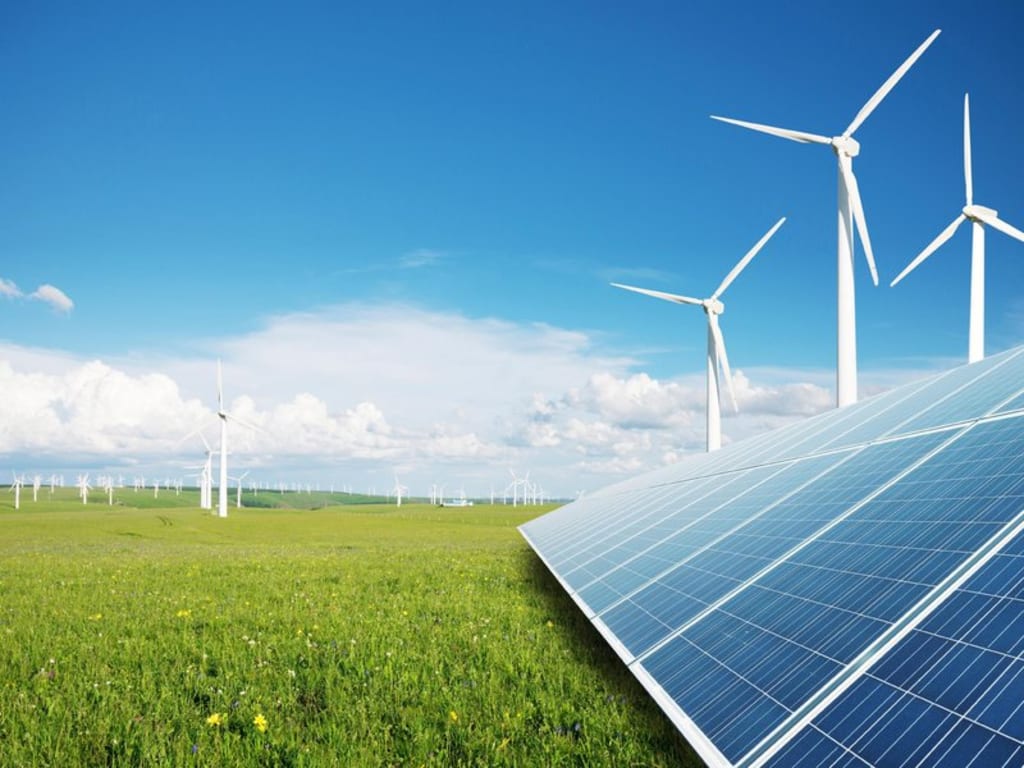Renewable energy
A Sustainable Pathway to a Cleaner Future.

Renewable energy is a type of energy that is derived from naturally replenishing resources, such as sunlight, wind, rain, tides, and geothermal heat. Unlike fossil fuels, which are finite and emit harmful pollutants, renewable energy sources offer a sustainable and clean way to power our lives.
Renewable energy has become increasingly popular in recent years as people have become more aware of the negative impact that fossil fuels have on the environment. The burning of fossil fuels releases carbon dioxide and other greenhouse gases into the atmosphere, contributing to climate change and air pollution. Renewable energy, on the other hand, produces little to no greenhouse gases and has a much lower impact on the environment.
One of the most popular forms of renewable energy is solar energy. Solar energy is produced by capturing the energy from the sun and converting it into electricity. This can be done using photovoltaic (PV) panels or concentrating solar power (CSP) systems. PV panels are the most common type of solar technology and are often installed on rooftops or in large solar farms. CSP systems, on the other hand, use mirrors or lenses to focus the sun's rays onto a single point, where the heat is then used to generate electricity.
Another popular form of renewable energy is wind energy. Wind turbines are used to capture the kinetic energy of the wind and convert it into electricity. Wind turbines come in various sizes, from small turbines that can be used to power individual homes or businesses to large offshore wind farms that can generate enough electricity to power entire cities. Hydropower is another form of renewable energy that uses the power of moving water to generate electricity. This can be done using dams, which create a reservoir of water that can be released to power turbines, or by using the flow of rivers or tides to turn turbines directly. Geothermal energy is a type of renewable energy that is produced by harnessing the heat from the Earth's core. This heat can be used to generate electricity or to provide heating and cooling for homes and buildings.
While renewable energy has many benefits, it also has some drawbacks. One of the biggest challenges with renewable energy is that it can be intermittent, meaning that it is not always available when it is needed. For example, solar energy is only available during daylight hours, and wind energy is only available when the wind is blowing. To overcome this challenge, energy storage technologies, such as batteries or pumped hydro storage, can be used to store excess energy for use when it is needed.
There are several examples of renewable energy sources, including:
Solar Energy: Solar energy is produced by capturing the energy from the sun and converting it into electricity using photovoltaic (PV) panels or concentrating solar power (CSP) systems.
Wind Energy: Wind energy is produced by harnessing the kinetic energy of the wind and converting it into electricity using wind turbines.
Hydropower: Hydropower is produced by harnessing the power of moving water, either by using dams or by using the flow of rivers or tides to turn turbines.
Geothermal Energy: Geothermal energy is produced by harnessing the heat from the Earth's core to generate electricity or to provide heating and cooling for homes and buildings.
Biomass Energy: Biomass energy is produced by burning organic matter, such as wood, crops, or waste, to generate electricity or heat.
Ocean Energy: Ocean energy is produced by harnessing the power of waves, tides, and currents to generate electricity.
These renewable energy sources have the potential to replace fossil fuels and reduce carbon emissions, helping to combat climate change and promote a more sustainable future.
Despite its challenges, renewable energy has the potential to transform the way we power our lives. As technology continues to improve and costs continue to decrease, renewable energy is becoming an increasingly viable option for meeting our energy needs in a sustainable and environmentally-friendly way.
About the Creator
Fat Ima
"I'll share fictional, motivational, nature and some environmental related articles.
please support me and do like and comment on my stories."
Enjoyed the story? Support the Creator.
Subscribe for free to receive all their stories in your feed. You could also pledge your support or give them a one-off tip, letting them know you appreciate their work.






Comments
There are no comments for this story
Be the first to respond and start the conversation.